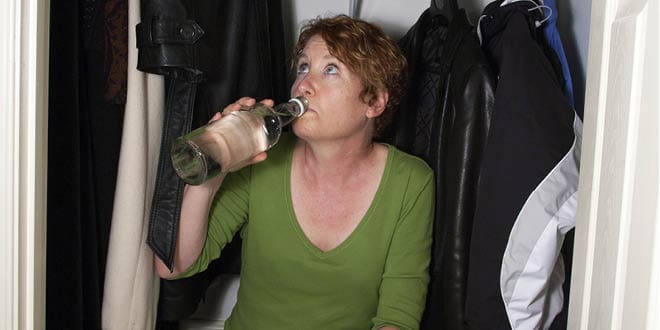Many people develop a habit of reaching for the bottle as soon as they walk in the front door. They find themselves working around the clock and then drink to try and feel normal. Before they know it, they are drinking more than two standard drinks per day and wonder why they are always feeling tired, agitated, irritable and unable to sleep without their secret alcoholic “top up” after dinner.
They go to events or parties and drink the same amount as most other people and then come home and open a bottle of wine. It’s a common pattern with a lot of people – drinking in isolation.
Many people drink to numb their feelings and a lot of women drink during menopause to try and combat feelings of anxiety and depression. Some drink to numb the feelings of abandonment when their marriage fails or their children leave home. Loneliness is part of my HALT reminder: don’t get too Hungry, Angry, Lonely or Tired as there is often a pattern to reach for the bottle when they find themselves in any of these situations.
Dieting can be a problem for secret drinkers as they often use alcohol instead of eating. Anger sets off resentment followed quickly by self-pity and before you know it, you are pouring yourself a drink. Drinking in isolation is a pattern for women whereas men tend to drink much more to be social.
Those who grow up with an alcoholic parent swear to God they will never drink because they don’t want to end up the same. Many believe that if they only drink a couple of times a week that will insulate them against the disease of alcoholism. They forget that binge drinking is just as deadly as daily drinking.
How to limit your alcohol intake
- Keep an alcohol diary and don’t cheat.
- Identify your triggers. Note the time, place and your emotions when you drink. This will isolate the key triggers, which will help you avoid such situations in the future.
- Reduce temptation by avoiding buying alcohol in bulk. Don’t buy specials. If you have alcohol at home, you are more likely to drink it. Buy smaller or half bottles or instead of drinking the whole bottle, pour the remainder into another sealable bottle for a later date. If you have problems with this, you had better contact me for advice. Social drinkers don’t have problems with alcohol!
- Drink responsibility. Pour your glass of wine to 100 ml, which is a standard serve and don’t refill it more than once. It’s a good idea to have one or two alcohol free days per week.
- Say ‘no’ to the top-up. Keep hold of your glass at parties and don’t let people keep topping up your drink. Wait until you have finished one before filling it up again. Don’t get involved in rounds or “shouts” and always buy your own drinks.
Nothing changes if nothing changes. You need to change your thinking to change your emotions to ultimately change your behaviour. The definition of insanity is doing the same thing over and over again. Is that you?
The age group of women who have the highest rate of drinking at risky levels is between 50 and 64 years of age. However, many of my patients range in age from 23 to 68. It’s not how much you drink; it’s what it does to your emotions. It is an emotional disease, coupled with a physical allergy to alcohol.
Signs you may have a drinking problem include:
- Drinking alone. Alcoholics often avoid or withdraw from social activities to find the time to drink.
- Can’t go a day without alcohol. You like to have a glass of wine with dinner, or maybe two or three, not to mention the after-work drinks with your friends. Does that make you a problem drinker? It depends. Australian guidelines suggest that, for women, any more than two standard drinks on any day are enough to increase your lifetime risk of harm from alcohol-related disease. More than four drinks or any singular occasion raises your risk of alcohol related injury. Drinking alcohol daily and not being able to go a day without reaching for the bottle should be a red flag that your habit is out of control.
- You lie about how much you drink. You may not want to admit how much alcohol you are consuming but lying about it is a sign that there could be a problem.
- You justify why you drink. Perhaps you have had the work day from hell, or a fight with your partner. Whatever the excuse, you are quick to offer a good reason, should anyone question you about your drinking behaviour. Many problem drinkers mistakenly believe that because they are still able to function every day, they don’t actually have a problem.
What can I do to control my drinking?
There is no such thing as “controlled drinking.” Have you ever tried to control diarrhoea? Social drinkers do not have a problem controlling their alcohol. If you think you have a problem, help is only a phone call or email away.
With the assistance of supplements, counselling, exercise and good nutrition, alcohol dependency can be put into remission, but never cured. Total abstinence is required to start the journey of recovery followed by counselling.
The brain chemistry must be functional. When it comes to feeling mentally and emotionally switched on, we have to have the correct brain chemistry – get it wrong and you will never achieve the feeling of wellbeing that you crave. The alcoholic has a predisposition to a depleted dopamine neurotransmitter – the centre of satisfaction in the brain. What can we do about it?









Leave A Comment